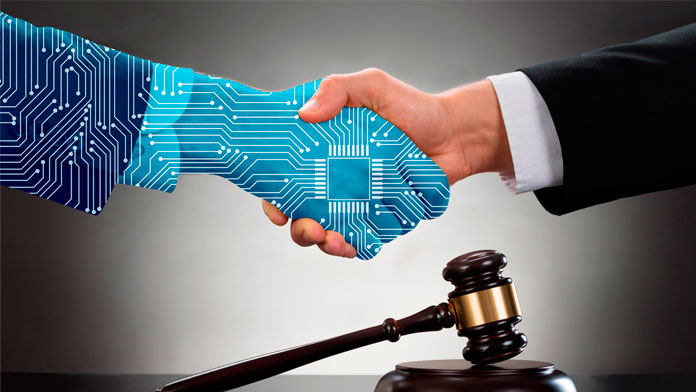The Influence of Artificial Intelligence on Human Rights: Are Our Freedoms at Stake?




In this space dedicated to exploring the wonders and challenges of emerging technologies, we invite you to delve into the fascinating world of artificial intelligence and its impact on human rights. Discover how AI is transforming our lives and raising fundamental questions about our freedoms. Are you ready to unravel the enigma of "The Influence of Artificial Intelligence on Human Rights: Are Our Freedoms at Stake?" in our Artificial Intelligence category?
Introduction to Ethics and Artificial Intelligence
The intersection between ethics and artificial intelligence is a topic of growing relevance in contemporary society. As AI continues to advance in areas such as medicine, justice, security, and labor, there is a need to carefully consider the ethical implications of its application. Ethics in artificial intelligence involves morally responsible decision-making and respect for fundamental human values, even when using algorithms and autonomous systems.
The discussion of ethics and AI focuses on issues such as transparency in algorithms, fairness in automated decisions, data privacy, accountability for the actions of autonomous systems, among other aspects. Addressing these ethical concerns is critical to ensuring that AI is used ethically and responsibly for the benefit of society.
The objective of this article is to explore the impact of artificial intelligence on human rights, as well as the ethical challenges that arise in its application.
The rapid evolution of artificial intelligence has generated significant impacts on human rights. While AI has the potential to improve quality of life and facilitate access to essential services, it also raises concerns regarding discrimination, privacy, and individual autonomy.
In the context of artificial intelligence, concerns arise about algorithmic discrimination, which occurs when algorithms make decisions that affect people unequally, based on characteristics such as gender, race, or ethnicity. Likewise, the massive collection of personal data to feed AI systems poses challenges in terms of privacy and the protection of personal information.
Furthermore, the increasing automation of work processes through artificial intelligence raises questions about the impact on employment and dignity at work. It is crucial to assess how AI may affect labor rights and equity in access to employment opportunities.
The application of artificial intelligence entails significant ethical challenges that must be addressed comprehensively. One of the key challenges is ensuring the transparency and explainability of algorithms, so that decisions made by AI can be understood and challenged by affected parties.
Another important ethical challenge is accountability in the development and use of AI. It is essential to establish mechanisms to assign responsibility in cases where AI systems generate adverse or unfair consequences. Likewise, oversight and regulatory mechanisms that promote the ethical adoption of AI must be considered.
Equity and non-discrimination are fundamental ethical principles that must be integrated into the design and implementation of artificial intelligence systems. It is crucial to develop strategies to mitigate and prevent algorithmic discrimination, as well as to promote equity in access to and distribution of the benefits of AI.
Given the growing concern about the impact of artificial intelligence on human rights, various ethical solutions and approaches have been proposed to mitigate risks and promote the responsible development of this technology. One key strategy is the implementation of robust regulatory frameworks that clearly define the boundaries and responsibilities of AI systems. These frameworks should incorporate fundamental ethical principles, such as transparency, accountability, and fairness, to ensure that decisions made by algorithms respect human rights and do not perpetuate bias or discrimination.
Another crucial approach is to foster collaboration among experts in ethics, human rights, technology, and other relevant disciplines. This interdisciplinarity is essential to addressing the ethical challenges of artificial intelligence in a comprehensive and holistic manner. Likewise, the active participation of civil society, affected communities, and human rights advocacy groups in policymaking and decision-making related to AI is encouraged, ensuring that diverse perspectives are considered and the interests of all involved are protected.
Furthermore, tools and methodologies are being developed and promoted to assess and mitigate algorithmic biases, as well as to ensure fairness and non-discrimination in the implementation of AI systems. These technical solutions, combined with a robust ethical framework, can significantly contribute to the protection of human rights in an environment increasingly influenced by artificial intelligence.
Relationship between Ethics and Artificial Intelligence
Ethics in the context of artificial intelligence refers to the application of moral principles and human values in the development, implementation, and use of AI systems. This involves considering the ethical implications of decisions made by AI algorithms, as well as the social, economic, and political impact they may have on society.
AI ethics also addresses issues related to privacy, transparency, fairness, and accountability in the design and deployment of artificial intelligence technologies.
It is essential to understand that ethics in artificial intelligence seeks to ensure that these technologies respect and promote human rights, thus avoiding potential violations or discrimination.
The ethical principles in the development and use of artificial intelligence seek to establish guidelines to ensure that these technologies are used responsibly and ethically. Some of these principles include transparency in the development of algorithms, fairness in their implementation, accountability of AI systems, and respect for user privacy.
In addition, they promote the inclusion of diversity and non-discrimination in the design of algorithms, as well as the fostering of interdisciplinary collaboration to address the ethical challenges posed by artificial intelligence.
These ethical principles seek to guide developers, companies, and governments in creating policies and regulatory frameworks that promote the ethical use of artificial intelligence for the benefit of society as a whole.
Legal and ethical considerations in artificial intelligence encompass aspects related to the legal liability of developers and users of AI systems, as well as the need to establish regulatory frameworks to regulate their use and mitigate potential risks.
It is crucial to address issues such as liability for harm caused by AI algorithms, the protection of personal data, automated decision-making, and the oversight of autonomous systems.
Furthermore, mechanisms must be established to ensure accountability and transparency in the development and use of artificial intelligence, as well as to protect people's fundamental rights against potential abuse or discrimination.
Artificial Intelligence and Human Rights
Artificial Intelligence (AI) has raised significant concerns regarding privacy and personal data protection. With the rise of AI, it has become more complex to control how personal data is collected, stored, and used. AI algorithms can analyze vast amounts of information to draw conclusions and predict behaviors, which poses challenges in terms of how this data is used and who has access to it.
In this sense, the implementation of AI raises the need to develop stricter regulatory frameworks that protect privacy and personal data. It is essential to establish clear regulations governing the use of AI in relation to privacy, ensuring that the fundamental rights of individuals are respected in an increasingly digital environment.
It is crucial to find a balance between the innovative potential of AI and the protection of privacy, so as to foster technological development without compromising individual rights.
AI has been criticized for its involvement in discrimination and bias. AI systems, by relying on historical datasets, can perpetuate and amplify existing prejudices, leading to significant risks of discrimination. For example, in the field of hiring, AI algorithms can reflect gender, racial, or age biases present in past hiring decisions, perpetuating inequalities and exclusions.
It is essential to address this issue by implementing AI development practices that minimize the introduction of bias and discrimination. This includes designing algorithms that are transparent, auditable, and subject to continuous evaluation to detect and correct potential biases. Likewise, it is necessary to promote diversity in the development of AI systems, as more diverse teams tend to produce more equitable and bias-free technologies.
Combating discrimination and bias in AI systems is crucial to ensuring that this technology respects human rights and contributes to building more just and inclusive societies.
The implementation of AI poses challenges related to access to information and freedom of expression. While AI can facilitate access to large volumes of information, it also raises questions about its reliability and veracity. AI algorithms that determine what content is shown to users can influence the diversity of opinions and perspectives, which in turn impacts freedom of expression and the right to receive truthful and pluralistic information.
It is crucial to ensure that AI systems do not unduly limit access to information or promote the spread of misinformation. This requires the development of transparency mechanisms that allow us to understand how AI algorithms make decisions about the presentation and filtering of information. Likewise, it is necessary to promote digital and media literacy so that people can understand and question the information they receive through AI-based platforms.
Protecting access to information and freedom of expression in the context of AI is critical to preserving fundamental rights in the digital age, promoting an environment in which people can access diverse and truthful information and freely express their ideas and opinions.
The intersection between artificial intelligence and the right to non-discrimination is a highly relevant issue today. While AI has the potential to make decisions impartially and objectively, it can also inherit and amplify biases existing in the data with which it is trained. This poses significant challenges for the protection of human rights, as algorithm-based decisions can perpetuate and exacerbate discrimination, undermining the fundamental principles of fairness and justice.
It is crucial that developers and decision-makers in the field of artificial intelligence be vigilant about mitigating bias and promoting fairness. This involves implementing responsible data collection practices, conducting regular assessments to detect potential bias, and incorporating safeguards to ensure that AI systems respect the right to non-discrimination in all its forms.
The European Commission has underscored the importance of addressing algorithmic discrimination and has proposed stricter regulations to oversee the impact of artificial intelligence on society. As we move toward an increasingly automated future, it is crucial to establish strong ethical and legal frameworks to ensure that artificial intelligence respects and protects human rights, including the right to non-discrimination.
Current and Future Developments in the Relationship between AI and Human Rights
The intersection between artificial intelligence (AI) and human rights poses ethical and legal challenges that require careful consideration and regulation. As AI becomes integrated into various aspects of society, it is critical to establish regulations and standards that protect people's fundamental rights.
Regulations in this area must address issues such as privacy, algorithmic discrimination, transparency in decision-making, and the accountability of AI systems. Clear boundaries must be established to ensure that AI implementation respects and protects human rights, avoiding potential abuses or violations.
Furthermore, it is crucial that these regulations be agile and adapt quickly as technology evolves so that they remain effective in protecting human rights in the context of AI.
Technological advances in the field of artificial intelligence pose significant ethical challenges related to human rights. For example, the massive collection of personal data to train AI systems raises questions about privacy and the protection of sensitive information. Likewise, the possibility of algorithms making decisions that affect people's lives, such as in the areas of justice or healthcare, requires careful ethical consideration.
It is essential that developers, researchers, and companies working in the field of AI actively consider these ethical aspects at all stages of development, from the conception of algorithms to their implementation in society. Ethical reflection must be an integral part of technological innovation so as to minimize risks to human rights.
Transparency in the design and operation of AI systems, as well as the involvement of ethics and human rights experts in their development, are fundamental steps to mitigate potential negative impacts and ensure that AI respects people's fundamental rights.
The protection of human rights in the context of AI is not only the responsibility of governments and businesses; society as a whole plays a crucial role in this area. It is essential to promote digital and ethical literacy among the population so that people are informed about the potential impacts of AI on their rights and freedoms.
Furthermore, civil society, non-governmental organizations, and human rights defenders play a key role in monitoring and reporting potential abuses or discrimination arising from the use of AI. The active participation of society in the regulation and oversight of AI is essential to ensure that this technology respects and protects human rights in all areas.
The intersection between AI and human rights poses complex challenges that require the collaboration of diverse actors, ethical consideration, and the effective implementation of regulations that protect the fundamental rights of individuals in the digital age.
Conclusions on Ethics and Artificial Intelligence in Relation to Human Rights
Final Considerations on the Ethical Impact of AI on Human Rights
The intersection between artificial intelligence and human rights poses significant ethical challenges that require deep and careful reflection. As AI continues to evolve and play an increasingly integral role in our lives, it is crucial to consider its impact on our fundamental freedoms. While AI offers opportunities to improve efficiency and decision-making, it also poses inherent risks that could undermine human rights if not managed ethically and responsibly.
It is critical to establish a robust ethical framework to guide the development and deployment of AI to ensure that human rights are respected and protected. This entails the need for transparency in the design of AI algorithms and systems, as well as safeguards to prevent bias and discrimination. Furthermore, it is crucial to foster accountability and ongoing oversight to mitigate the potential negative impacts of AI on human rights.
Collaboration between ethicists, AI developers, policymakers, and human rights advocates is essential to effectively address these challenges. By fostering open and constructive dialogue, we can work toward a future where AI is used ethically and in compliance with fundamental human rights principles, thereby preserving our freedoms in the digital age.

 IHRO NEWS
IHRO NEWS